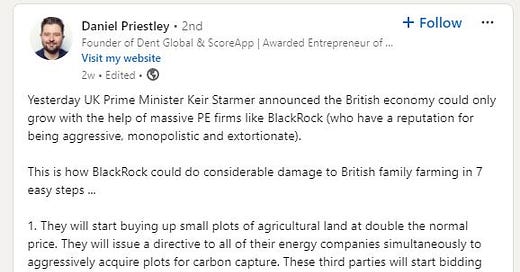Kay: Rob’s comments in italics
Derek’s comments in normal font
Our topic today is farming, some of the changes coming in the agricultural sector and BlackRock's potential involvement and firms like BlackRock. I wondered if I should just start.
This topic was requested by a listener who pointed us towards one of Daniel Priestley's LinkedIn posts. I'm going to start by reading that out just as a starting point…
Yesterday UK Prime Minister Keir Starmer announced the British economy could only grow with the help of massive PE firms like BlackRock (who have a reputation for being aggressive, monopolistic and extortionate).
This is how BlackRock could do considerable damage to British family farming in 7 easy steps ...
1. They will start buying up small plots of agricultural land at double the normal price. They will issue a directive to all of their energy companies simultaneously to aggressively acquire plots for carbon capture. These third parties will start bidding against each other and force the value of agricultural land up.
2. Initially farmers won't believe their luck - "these city folks are mad! if they want to buy an acre for £50K, who am I to say no to these fools" is what you'll hear down the pub.
3. These crazy prices will set record high comparisons for agricultural land. When a farmer dies, their farm will be valued using these new metrics and the next generation will discover the farm they thought was worth £3M is worth £9M and they don't have anything close to the money needed to cover the tax.
4. In swoops a BlackRock subsidiary with a "Agri Debt Finance Tax Relief" product to lend them 20% the "value" of their farm so they can pay the taxes.
5. The debt will come with conditions (a covenant) that the farm has to adopt and maintain certain practices. It has to use certain BlackRock owned fertilisers, software, machinery and labour solutions that get the farm ready to interface with a larger conglomerate.
6. When a farm cannot make its debt payments, it is sold at auction. BlackRock subsidiaries are instructed NOT to buy these farms at auction. They have a special arrangement to buy the unsold farms at a rate that covers the unpaid debt plus outstanding fees and taxes to government... basically what the farm was originally worth.
7. A BlackRock subsidiary then takes over the farm, consolidates it with a massive group of farms that uses illegal immigrant labour to staff the farms (which will be another government program they institute to deal with the immigration crisis). The government will subsidise the labour costs as part of this plan making the farms wildly profitable and making small family farms unable to compete.
To anyone unfamiliar with the mind of a Private Equity General Partner, this will seem totally far fetched. To anyone who's had even the smallest dealings with the PE world, you will recognise this as a standard playbook for extracting value at a large scale. Mark my words, save this post and watch it all play out.
What's your take, Derek?
Well, I think that's 100% spot on. Within the last couple of weeks, BlackRock announced it has a $100 million hedge fund specifically targeted at British agriculture. The background includes one of the most surprising moves from the budget - the inheritance tax relief for family farms was effectively eliminated. Did we talk about this?
I think we discussed this two weeks ago, but it might be worth revisiting…
The situation involved an inheritance tax exemption for family farms so farms could pass to the next generation intact. This has effectively been eliminated. The budget presented a threshold for inheritance tax at a million pounds.
Most of the population probably thought, “well, if they've got a farm worth more than a million pounds, they might as well pay inheritance tax!”
All in the value is in the farm though, isn't it? It's all tied up.
It's all tied up. The farmhouse alone in many places would be worth a million pounds on the open market. Then you've got barns, farm machinery, fields. Agricultural land has roughly tripled in price in the last 10 years.
A thousand-acre farm, which isn't big by any means, would have farmland value of seven million. This BlackRock Agricultural Fund isn't only investing in farms potentially, but already invests in fertiliser and pesticide companies. It's quite obvious that any farms that come under their control would be integrated into all of the agriculture, which is going completely in the wrong direction for a sustainable future.
Immediately prior to the budget, Keir Starmer entertained Bill Gates and Larry Fink at 10 Downing Street. Lo and behold next week came a budget with this ridiculous measure, then BlackRock announced their British agriculture investment fund. lackRock announced that they have this fund to invest so-called in British agriculture. You'd have thought that they'd at least be subtle enough to leave it a couple of months before making that announcement just so it wasn't quite so obvious!
Anyway, the post has gone viral, cropping up on forums and discussions. I found a reference to it on Facebook.
More people realise these things are happening. We must reach some threshold of awareness before anything changes, but sooner or later we must get some pushback.
Well, I've been following the farmers' protest in the Netherlands regarding nitrogen-based fertilisers and climate change limits. It's part of a wider trend we discussed before this call, going back a hundred years.
This mirrors the Great Depression playbook. In 1930, America comprised small plots with individual family farms. By decade's end, most farmland belonged to gigantic agribusinesses.
Big business and banking achieved a dual victory. Every small town had its own bank in 1930. Banks lent money to farmers to modernise their techniques through modern agricultural machinery.
The Great Depression hit, worsened by weather systems and the Dust Bowl. Unsound agricultural practices aggravated everything - stripping hedgerows that formed windbreaks, making vast monoculture fields.
Yeah. It's the opposite of regenerative farming, wasn’t it?
Farmers struggled with loan repayment payments to local banks for machinery. Local banks foreclosed mortgages, repossessing farms and machinery. Small banks across America found themselves with farms and machinery they couldn't manage.
The banks faced a liquidity crisis. Big banks bought the little banks, then sold acquired farmland to big agricultural conglomerates. That's how the transfer occurred. So we're looking at a fairly blatant rerun here.
It's amazing how often these things happen in different circumstances, though perhaps not on this scale. It comes down to controlling money, food, energy.
We need local-level control where people have vested interests in their surroundings and land. That has to happen, doesn't it? Otherwise, do we have a long-term future as a species if we don't care for the land?
We certainly don't. Life on Earth will continue regardless! The human race could easily go extinct. The other threat we face, which nobody seems bothered about, is nuclear war.
Yeah, the earth will be fine. I'm just not sure we will be.
Our friend in the Salisbury campaign for nuclear disarmament drafted a letter to the local paper. Surprisingly, they published it prominently, highlighting Britain's reckless participation in aggravating Russian conflict.
The answers lie in shining light on these issues through conversation. We're looking to change the root metaphors guiding our decision-making. Productive discussion can change "us versus them" and "man versus nature" metaphors.
I noticed something today. I went to drop off a parcel at Morrison's Daily, a small high-street shop in their chain. All supermarkets have them - Sainsbury's has a local version, Tesco has local stores.
Thirty years ago, these shops were all completely independent. They've been absorbed into larger chains. Now a few big retailers effectively share monopoly control over former competitors.
This follows any large quoted company's imperative to keep growing. They must keep expanding profits. Of course, some methods to expand profits are legitimate, others highly dubious. As legitimate ways become exhausted, profits expand by consuming smaller competitors.
It's got to reach a point where those processes themselves have got no further to grow. Eventually, we're going to have some kind of reckoning. Exactly what kind, we don't know. But I think that you and I are a stand for the fact that out of this, it's entirely possible that a completely different and more humane, sustainable way of organising human affairs is going to come out of it.
Thanks for reading this episode of Sovereign Finance. For more episodes, transcripts, in-depth articles, and the community, please take a minute now to subscribe free using the button above. You’ll receive a free email notification whenever we publish a new article or conversation.
















Share this post